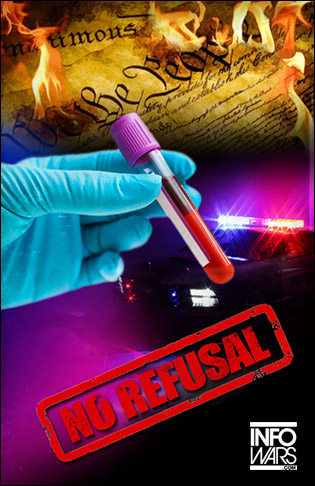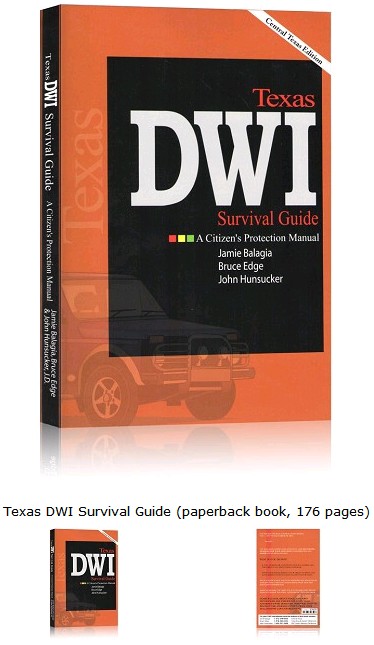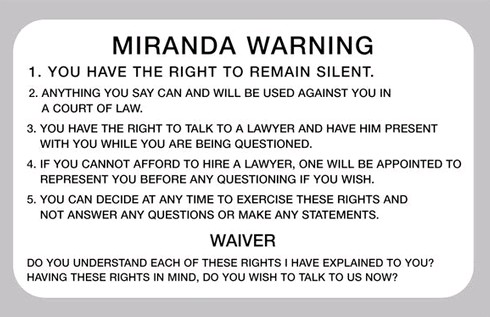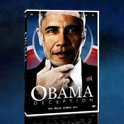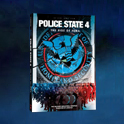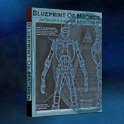welcome
|
||||||||
MIRANDA RIGHTS
The Miranda warning, also referred to as Miranda rights or Miranda rule, is a warning given by police in the United States to criminal suspects in police custody (or in a custodial interrogation) before they are interrogated to preserve the admissibility of their statements against them in criminal proceedings. The Miranda warning is part of a preventive criminal procedure rule that law enforcement is required to administer to protect an individual who is in custody and subject to direct questioning or its functional equivalent from a violation of his or her Fifth Amendment right against compelled self-incrimination. In Miranda v. Arizona, the Supreme Court held that the admission of an elicited incriminating statement by a suspect not informed of these rights violates the Fifth Amendment and the Sixth Amendment right to counsel, through the incorporation of these rights into state law.[Note 1] Thus, if law enforcement officials decline to offer a Miranda warning to an individual in their custody, they may interrogate that person and act upon the knowledge gained, but may not use that person's statements to incriminate him or her in a criminal trial.Template:384 U.S. 436 In Berghuis v. Thompkins, the Supreme Court held that unless a suspect expressly states that he or she is invoking this right, subsequent voluntary statements made to an officer can be used against him in court, and police can continue to interact with (or question) the suspect.
YOUR RIGHTS WITH THE POLICE
The Script You Need To Stay Out of Jail [vid] Published on Apr 16, 2015 Eddie Craig breaks down just what you need to say and do to stay out of jail when you're pulled over by the police.
Secrets Police Don't Want You To Know [vid] Eddie is an Air Force veteran that began
realizing that the government was lying to the people at virtually every turn. He earnestly begin his research into
government rules and statutes in the mid 90's after he witnessed his mother breakdown into tears of hopeless
frustration over a property tax bill that threatened to take away her property and home.
Blatant Tyranny!! (Must-See Video Below)
Tennessee Rolls Out “No Refusal” Blood-Draw DUI Checkpoints for Labor Day
Each holiday lends police another excuse to acclimate the public toward
their intrusive police state enforcement tactics
Activist
Post
Labor Day: another holiday, another excuse to push the limits of the police power over citizens. All across the state, Tennessee police will be performing another round of highly-publicized “no refusal” blood-draw DUI checkpoints this weekend. With police armed with a 2012 law that allows them to forcibly extract blood from drivers, it's a bad time to be a citizen who does not consent to searches. Forcible blood draws began in Tennessee in 2009, being used only for cases of vehicular assault. In all other circumstances, the blood draws were not forcible. They could be declined, with the understanding the DUI suspect’s driver’s license would be suspended. Tennessee calls it the Implied Consent Statute. That changed January 1, 2012, with the enactment of a new law that took away that choice for suspects to decline with a license suspension. Ever since the law took effect, police can obtain rubber-stamped warrants to forcibly extract blood from any driver they decide is a DUI suspect. Additionally, the new law now mandates blood be drawn from citizens in a variety of circumstances. No longer limited to vehicular assault cases, police are not required to take the blood of any DUI suspect who has ever had a DUI conviction in their life, according to WBIR. The other requirement is that blood be drawn from any suspect who has a person under the age of 16 in the car. The rest of the blood-draw cases are done upon seeking a readily available warrant. In light of these new powers, the latest fad in Tennessee law enforcement is setting up “no refusal” checkpoints, having a judge or a judicial commissioner on call to churn out blood warrants on demand. Rather than spread out across a town, looking for probable cause to stop vehicles, police stop everyone, lacking any tangible reason to initiate each stop.
Tennessee police to perform "no
refusal" blood-draw TENNESSEE — Labor Day: another holiday,
another excuse to push the limits of the police power over citizens. All across the state, Tennessee police will be
performing another round of highly-publicized "no refusal" blood-draw DUI checkpoints this weekend. With police
armed with a 2012 law that allows them to forcibly extract blood from drivers, its a bad time to be a citizen who
does not consent to searches.
Every driver who refuses to blow is
strapped to a table, GEORGIA -- In some Georgia counties, as
well as all over the USA, drivers are getting their blood forcibly stolen from them. As shown in this video, every
driver who refuses to give the police a blow, even for misdemeanor offenses, is strapped to a table, put into a
headlock by a police officer, and their blood forcibly taken.
What To Do When Confronted by Police
Our Crumbling Individual Rights with Radio Host Eddie Craig 1
Our Crumbling Individual Rights with Radio Host Eddie Craig 2
How to Defeat Predatory Cops and Prosecutors
Alex talks with Jamie Balagia, a trial attorney known as the "DWI Dude." Balagia is a former
Austin police officer known for going head-to-head in court over spurious charges brought by predatory cops and
prosecutors. He is lauded for his work in social activism, civil rights, and police accountability.
Police Lining Their Pockets with DWI Arrest Fees & More [vid] The authors of the Texas DWI Survival Guide: A Citizen's Protection Manual, Jamie Balagia,
Bruce Edge and John Hunsuckers, are undoubtedly in the top ten of DWI lawyers in the country. Alex is also joined
by Attorney Jamie Balagia "The DWI Dude" about our rights under the constitution and how we can enact them to
empower us against tyranny.
Former Cops Expose Bogus DWI Charges [vid] David Knight hosts and we speak with Jamie Balagia & Steve Montague of DWIdude.com.
10 Rules for Dealing with Police (Full-Length) MORE INFO ON DEALING WITH POLICE ......
How to Cop Proof Your Cell Phone The California Supreme Court reached a decision in People v. Diaz that police may lawfully search mobile phones on arrested individuals, without first obtaining a search warrant. So with this ruling, should we just call privacy dead or are there still tricks to keep your personal information safe? Competitive Enterprise Institute's Ryan Radia explains.
Dr. Benjamin Rush "Education is favorable to Liberty. Freedom can only exist in a society of knowledge. Without learning, men are incapable of knowing their rights, and where learning is confined to a few people, Liberty can neither be equal nor universal." LINKS: The Constitution | Bill of Rights
REACH OUT TO OTHERS [Help Educate Family And Friends With This Page And The Links Below]
RELATED LINKS: Assassination
Program | NDAA | Indefinite Detention and
Torture |You Are Being Targeted | Foreign Troops Training To Confiscate Guns of Americans | Law Enforcement Requested Shooting Targets of Pregnant Women | Psywars - The Selling Out of Alex Jones/Infowars
| ||||||||

